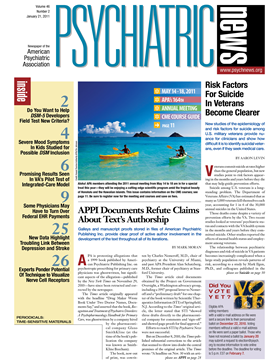On Saturday, December 11, 2010, the APA Board of Trustees made history when it voted unanimously to have a permanent voting minority representative on the Board of Trustees. This Board seat will be occupied by a member of one of APA's seven minority and underrepresented (M/UR) group caucuses. Those caucuses represent American Indians, Alaska Natives, and Native Hawaiians; Asian Americans; blacks; Hispanics; international medical graduates (IMGs); gays, lesbians, and bisexuals; and women.
APA has attempted to address minority constituents' concerns for many decades. In the 1960s, a “think tank” was established to consider minority issues, and Dr. Jeanne Spurlock, a former deputy medical director of APA, was instrumental in the initial development of minority caucuses within the organization. At the same time, the Committee of Black Psychiatrists petitioned the Board for more involvement at a policy level. This petition resulted in the creation of an observer seat on the Board, which was filled by the chair of the Committee of Black Psychiatrists until 2009, when the M/UR component committees, along with many other components, were eliminated as part of an effort to reorganize and streamline the Association's governance structure.
However, because of concerns that the elimination of the M/UR committees and the loss of the observer seat on the Board might limit the impact of the minority community within APA, the Board established a work group to recommend mechanisms to assure that adequate representation and attention to minority issues were maintained within the Association. The work group met with M/UR caucus leaders and other relevant APA members to develop ways to ensure that the value and functions of these “identity groups” would remain vital and productive.
One of the most important recommendations was to elect an M/UR member to the Board of Trustees. Other work group recommendations were intended to ensure that the minority caucuses are fully engaged in communicating their views and concerns regarding the issues important to M/UR psychiatrists and the mental health of minority populations. As with all changes to Board structure, the plan to elect this new member has been sent to the Committee on Bylaws for implementation. We anticipate that the committee will complete its work in time for the 2012 election cycle so that the position will commence with the first meeting of the 2012-2013 Board of Trustees at the end of the 2012 annual meeting in Philadelphia.
The process of seating a new M/UR trustee is being entrusted in large measure to the M/UR caucuses, those APA members who have the greatest interest in ensuring that M/UR perspectives are available to the Board. Caucus participation is open to any member who fits the criterion of minority status for the particular caucus. In the longer term, we hope that the minority caucuses will provide enhanced opportunities for members to contribute to APA policy.
As I noted above, the action passed by the Board included the requirement that candidates must be a member of one of the seven minority caucuses and recommended by his or her caucus. The Assembly Committee of Representatives of Minority and Underrepresented Groups, composed of 14 elected representatives and deputy representatives, will select two nominees and an alternate from the pool of caucus recommendations. The names of nominees and an alternate will be forwarded to the APA Nominating Committee, which will post the nominees for election. Only registered members of the M/UR caucuses will be eligible to vote in the election for the M/UR trustee position.
The Council on Minority Mental Health and Health Disparities has received a clear charge to provide active liaison between the council and the caucuses.
As the process of seating the new M/UR Trustee moves forward, the chair of the Assembly M/UR Committee (currently Dr. Paul Yeung) and the chair of the council (Dr. Sandra Walker) will participate as guests in the proceedings of the Board.
Ultimately, the Board's decision to establish a permanent, fully enfranchised M/UR seat is an important step in realizing the organizational goals of the recently formulated “Outline for the APA Action Plan on Enhancing Diversity” and the 2004 APA Board-endorsed “Plan of Action: Reducing Mental Health Disparities for Racial and Ethnic Minorities,” which was initiated during Dr. Richard Harding's term as APA president.
We hope that through the identification of nominees from diverse constituencies to the Board of Trustees, there will be enhanced progression of minority psychiatrists to APA leadership positions. Also, we believe that with the addition of this designated Board position, there will be greater awareness of and interest and participation in the M/UR caucuses and greater knowledge about issues important to psychiatric patients from all backgrounds.
To join one of APA's M/UR caucuses, go to Members Corner at <
www.psych.org>, select “Member Profile Update,” and then complete Section 3F. You can also e-mail your request to
[email protected] or call (888) 357-7294.


